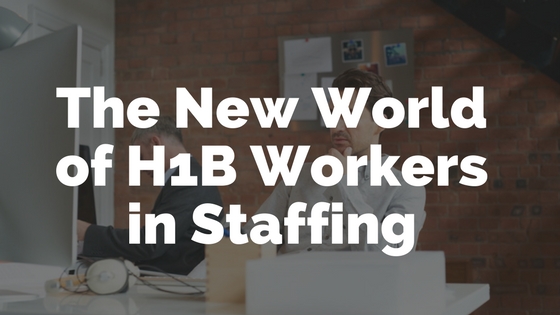
16 Apr The New World of H1B Workers in Staffing
The Federal Government recently released two significant policy memos that will directly affect workers in the US applying for H1B’s and the companies that employ them. Coming at the beginning of the week when the USCIS accepts H1B applications for the next fiscal year starting October 1, 2017, these memos herald a possible sea change in the world of visa holders employed by staffing and consulting companies in the US.
First, on 3/31/17 the USCIS issued a new Policy Memorandum stating that entry level computer programmers may not qualify as a “specialty occupation” as required to obtain a H1B, since there are programming jobs that can be filled by candidates with only a 2 year degree. The USCIS specified that to qualify for a H1B in a computer-related profession, the worker must have a four year degree or higher in the specific specialty related to his/her computer programming job. Common degrees such as Bachelor of Commerce, therefore, will not be deemed adequate to prove the worker is employed in a specialty occupation and the application may be denied.
Next, an additional Memorandum was issued on 4/3/17 stating that “combating fraud in our employment-based immigration programs is a priority for USCIS.” To this end, USCIS will begin focusing on validation of employers and visa holders that fall in any of the following categories:
- Where USCIS is unable to validate the employer’s business information through commercially available data
- Employers that are H1B dependent (many visa workers as a proportion of total staff)
- Employers petitioning for H1B workers who work at another company’s location.
The last bullet is widely regarded to target staffing and consulting companies. In 2014 (the last year for which information is available), just 13 outsourcing firms accounted for a third of all H1B’s granted, according to the New York Times. The top companies were Tata Consultancy Services, Infosys and Wipro. These companies’ US workers mostly work at client sites and are often less senior IT workers, categories that were called out as needing additional scrutiny in both USCIS memos.
In this new environment, clients utilizing this category of worker might be surprised by unannounced visits to their site by USCIS. USCIS has always had the right to conduct these visits, but the pace is expected to accelerate significantly.
As a result, technology companies that depend heavily on visa workers to complete their projects may shift their development sites to be more heavily offshore. Major outsourcing companies also all have offshore development sites that would potentially be utilized rather than teams of consultants working onsite in the US. Recently, Eastern Europe has become increasingly attractive to companies looking for strong engineering and IT talent in addition to the traditional offshore development locations in India and China.
US companies will continue to rely heavily on H1B workers in the technology space, but the world is changing. PrideOne can be your trusted advisor to help navigate through the changes and optimize the talent in your non-employee workforce. If you have any questions regarding these developments, please send us a note through our contact page.
Author
 Kate Goss
Kate Goss
Managing Director, PrideOne
Kate Goss is the Managing Director of PrideOne, leading the Managed Service Provider (MSP) division of Pride Global. With over 20 years of experience in contingent workforce management and staffing, Kate is a trusted advisor to clients who seek IT and non-IT contingent labor vendor management solutions, including payroll and passthrough programs.



